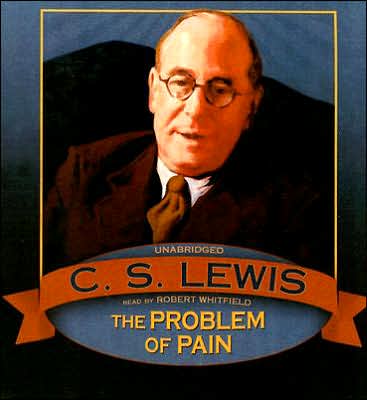Jill Heatherly writes: The Problem of Pain answers the universal question, "Why would an all-loving, all-knowing God allow people to
 experience pain and suffering?" Master Christian apologist C.S. Lewis asserts that pain is a problem because our finite, human minds selfishly believe that pain-free lives would prove that God loves us. In truth, by asking for this, we want God to love us less, not more than he does. "Love, in its own nature, demands the perfecting of the beloved; that the mere 'kindness' which tolerates anything except suffering in its object is, in that respect at the opposite pole from Love." In addressing "Divine Omnipotence," "Human Wickedness," "Human Pain," and "Heaven," Lewis succeeds in lifting the reader from his frame of reference by artfully capitulating these topics into a conversational tone, which makes his assertions easy to swallow and even easier to digest. Lewis is straightforward in aim as well as honest about his impediments, saying, "I am not arguing that pain is not painful. Pain hurts. I am only trying to show that the old Christian doctrine that being made perfect through suffering is not incredible. To prove it palatable is beyond my design." The mind is expanded, God is magnified, and the reader is reminded that he is not the center of the universe as Lewis carefully rolls through the dissertation that suffering is God's will in preparing the believer for heaven and for the full weight of glory that awaits him there. While many of us naively wish that God had designed a "less glorious and less arduous destiny" for his children, the fortune lies in Lewis's inclination to set us straight with his charming wit and pious mind.
experience pain and suffering?" Master Christian apologist C.S. Lewis asserts that pain is a problem because our finite, human minds selfishly believe that pain-free lives would prove that God loves us. In truth, by asking for this, we want God to love us less, not more than he does. "Love, in its own nature, demands the perfecting of the beloved; that the mere 'kindness' which tolerates anything except suffering in its object is, in that respect at the opposite pole from Love." In addressing "Divine Omnipotence," "Human Wickedness," "Human Pain," and "Heaven," Lewis succeeds in lifting the reader from his frame of reference by artfully capitulating these topics into a conversational tone, which makes his assertions easy to swallow and even easier to digest. Lewis is straightforward in aim as well as honest about his impediments, saying, "I am not arguing that pain is not painful. Pain hurts. I am only trying to show that the old Christian doctrine that being made perfect through suffering is not incredible. To prove it palatable is beyond my design." The mind is expanded, God is magnified, and the reader is reminded that he is not the center of the universe as Lewis carefully rolls through the dissertation that suffering is God's will in preparing the believer for heaven and for the full weight of glory that awaits him there. While many of us naively wish that God had designed a "less glorious and less arduous destiny" for his children, the fortune lies in Lewis's inclination to set us straight with his charming wit and pious mind.Robert Aarhus commented: From a non-Christian POV, I would be surprised if this book made much sense -- so many of the pillars are set on Christian theology, philosophy, and tradition. If you cannot (or will not) accept the possibility of the existence of Heaven, Hell, or God, this book will be just so much incomprehensible babble. But, it is not written for that segment of the market. This book is best read by the thinking Christian who has reservations about aspects of Christianity that seem to gloss over, avoid, or ignore the issue of human suffering.
Lewis analyzes the fundamental question, or problem, of pain: how can God be omnipotent and yet allow pain (war, injury, cruelty, etc.)? Lewis's answer has many levels. Foremost, is that nature had to be created with certain unchangeable properties. For example, the same hardness which allows wood to serve as a beam in my house allows it to serve as an instrument of potential injury, as when that beam collapses and hits my head.
The world also had to be created neutral so that humans could interact equally with one another, i.e., those same, unchanging properties of wood allow it to be manipulated similarly by anyone. But, obviously a neutral world contains the potential for good or evil. Wood can be used to build a home, which is good, or to create a weapon, which is evil. But, this is what makes us human. We have free will.
If I choose evil, God could not intervene. For to intervene some times but not others would be unjust and illogical (this is why miracles, if you believe in them, are extraordinarily rare). And to intervene once is to intervene always. Imagine if God intervened each time one person was going to cause another, or himself, pain. If he did, we all would be puppets, not humans.
Another interesting idea in this book is that of Original Sin. According to Lewis, we have not inherited Adam's sin but instead everyday face Adam's identical choice, perhaps thousands of times a day. For Adam's sin was not disobedience in eating the apple, but in choosing himself over God. Adam had the opportunity to see himself either as a creation or an individual self existing apart from God. Thus, according to Lewis, a final reason for pain, is that it is God's wake-up call that we have, in constantly choosing ourselves, chosen the wrong thing.
Why would a good God create a world in which there is suffering?
Posted April 10, 2010
